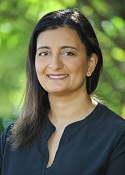Exams in the Parking Lot, Helping Schools Adjust, Grieving with Families

Datta Munshi, MD, FAAP
March 4, 2022
The last two years have been unlike any other.
Personally, I adjusted work schedules around virtual school and connected with family and friends over Zoom. We planned, cancelled, and replanned family gatherings and vacations. Professionally, our practice scrambled to gather information about the new threat called COVID-19 and readjusted work schedules and instituted new cleaning protocols for our offices.
We stepped into the world of telehealth and exams in the parking lot to stay connected and guide our scared families. When it became evident that COVID-19 was going to affect safe school attendance, we kept up with emerging scientific data and collaborated with schools at local, state, and national levels to advocate for holistic decision-making that would prioritize children’s safety, social connectedness, and engagement with education.
We rejoiced when vaccines became available and anxiously awaited inclusion of our patient populations.
We have mourned alongside families and counseled on some aspect of mental health in every room we walk into. We have had countless conversations about the importance of public health measures such as masking and grappled with vaccine hesitancy at an unprecedented level.
We are fatigued, but we look ahead to the challenges that are waiting for us not so far in the future. The scale of loss, trauma, social isolation, and inequity from COVID-19 is undeniable. We know that the full scope of the challenges children will face is unknown. The future seems daunting, but we must focus on the resiliency advice we give to our own patients every day.
Let's choose to focus on factors that are in our control and on the progress we have made over the last two years.
At the beginning of the pandemic, many of us were unfamiliar with telehealth in our daily workflows. A survey completed in 2016 by the AAP showed that only 15% of pediatricians had used telehealth in 2015. That percentage jumped to 97% in 2021. By rapidly implementing telehealth into our daily workflows, we have prioritized consistent connection with our patients and offered a trusted link for families to turn to during uncertain times.
Vaccination against COVID-19 is a powerful tool to safely get children and families back to their normal lives. While many of us have faced challenges convincing some families and wish that vaccination rates were higher in our communities, we need to take a minute to acknowledge our collective success in this arena. As of late February 2022, 9.1 million, or 32% of children in the 5-11 age group, have received at least one dose of COVID-19 vaccine and 57% of children ages 12-17 are fully vaccinated.
We are making progress, and pediatricians continue to be considered a trusted source for families to help them make decisions concerning vaccinations.
The pandemic has exacerbated an already escalating pediatric mental health crisis. It is estimated that 140,000 children in the U.S. have lost a primary or secondary caregiver, with this burden being higher in communities of color and those with high rates of immigrants. Rates of depressive symptoms and anxiety are now double what they were pre-pandemic. Increased reliance on screens secondary to disruptions in socialization opportunities and physical activity have had detrimental effects on the physical and mental health of our patients.
The declaration from the AAP and other organizations that child and adolescent mental health is a national emergency hopefully will increase federal funding to support evidence-based screening, diagnosis, and treatment efforts at all levels to bring vital funding to pediatric mental health interventions.
“While the pandemic has certainly cast a harsh light on the complexity of addressing pediatric physical and mental well-being, it has also brought out the best in us as individuals and as a community.”
Some days I revel in all the progress we have made to “get back to normal” and, on other days, I feel overwhelmed by the challenges we continue to face. While the pandemic has certainly cast a harsh light on the complexity of addressing pediatric physical and mental well-being, it has also brought out the best in us as individuals and as a community.
I am going to continue to focus on the positive and put one foot in front of the other and try my best to make a positive difference, one family at a time.
*The views expressed in this article are those of the author, and not necessarily those of the American Academy of Pediatrics.
About the Author
Datta Munshi, MD, FAAP
Datta Munshi, MD, FAAP, is a community pediatrician in Georgia with a strong interest in pediatric behavioral health. She also serves on the Georgia AAP School Health Committee.